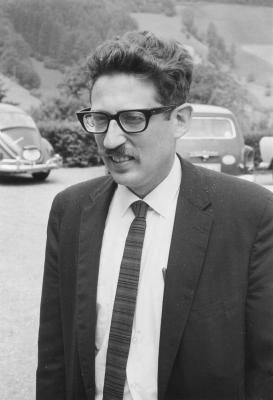In mathematics, the uniformization theorem states that every simply connected Riemann surface is conformally equivalent to one of three Riemann surfaces: the open unit disk, the complex plane, or the Riemann sphere. The theorem is a generalization of the Riemann mapping theorem from simply connected open subsets of the plane to arbitrary simply connected Riemann surfaces.

Nathan Jacobson was an American mathematician.

Phillip Augustus Griffiths IV is an American mathematician, known for his work in the field of geometry, and in particular for the complex manifold approach to algebraic geometry. He is a major developer in particular of the theory of variation of Hodge structure in Hodge theory and moduli theory, which forms part of transcendental algebraic geometry and which also touches upon major and distant areas of differential geometry. He also worked on partial differential equations, coauthored with Shiing-Shen Chern, Robert Bryant and Robert Gardner on Exterior Differential Systems.

Robert Vaughan Moody, is a Canadian mathematician. He is the co-discoverer of Kac–Moody algebra, a Lie algebra, usually infinite-dimensional, that can be defined through a generalized root system.

Daniel J. Kleitman is an American mathematician and professor of applied mathematics at MIT. His research interests include combinatorics, graph theory, genomics, and operations research.
Lipman Bers was a Latvian-American mathematician, born in Riga, who created the theory of pseudoanalytic functions and worked on Riemann surfaces and Kleinian groups. He was also known for his work in human rights activism.
Eliezer 'Leon' Ehrenpreis was a mathematician at Temple University who proved the Malgrange–Ehrenpreis theorem, the fundamental theorem about differential operators with constant coefficients. He previously held tenured positions at Yeshiva University and at the Courant Institute at New York University.

David Mark Goss was a mathematician, a professor in the department of mathematics at Ohio State University, and the editor-in-chief of the Journal of Number Theory. He received his B.S. in mathematics in 1973 from University of Michigan and his Ph.D. in 1977 from Harvard University under the supervision of Barry Mazur; prior to Ohio State he held positions at Princeton University, Harvard, the University of California, Berkeley, and Brandeis University. He worked on function fields and introduced the Goss zeta function.
In the mathematical theory of Kleinian groups, Bers slices and Maskit slices, named after Lipman Bers and Bernard Maskit, are certain slices through the moduli space of Kleinian groups.

Shmuel Agmon is an Israeli mathematician. He is known for his work in analysis and partial differential equations.

Maciej Zworski is a Polish-Canadian mathematician, currently a professor of mathematics at the University of California, Berkeley. His mathematical interests include microlocal analysis, scattering theory, and partial differential equations.

Edward James McShane was an American mathematician noted for his advancements of the calculus of variations, integration theory, stochastic calculus, and exterior ballistics. His name is associated with the McShane–Whitney extension theorem and McShane integral. McShane was professor of mathematics at the University of Virginia, president of the American Mathematical Society, president of the Mathematical Association of America, a member of the National Science Board and a member of both the National Academy of Sciences and the American Philosophical Society.
James Dugundji was an American mathematician, a professor of mathematics at the University of Southern California.
Gilbert Agnew Hunt, Jr. was an American mathematician and amateur tennis player active in the 1930s and 1940s.
Bernard Maskit is an American mathematician known for his expertise in Kleinian groups. The Maskit slice through the moduli space of Kleinian groups is named after him; he is the author of the book Kleinian Groups and gave an invited talk about Kleinian groups at the 1974 International Congress of Mathematicians.
Kenneth C. Millett is a professor of mathematics at the University of California, Santa Barbara. His research concerns low-dimensional topology, knot theory, and the applications of knot theory to DNA structure; his initial is the "M" in the name of the HOMFLY polynomial.
Clifford John Earle, Jr. was an American mathematician who specialized in complex variables and Teichmüller spaces.
Halsey Lawrence Royden, Jr. was an American mathematician, specializing in complex analysis on Riemann surfaces, several complex variables, and complex differential geometry. Royden is the author of a popular textbook on real analysis.
Kurt Strebel was a Swiss mathematician, specializing in geometric function theory.

Boris Isaac Korenblum was a Soviet-Israeli-American mathematician, specializing in mathematical analysis.
The original article was a translation of the corresponding German article.









